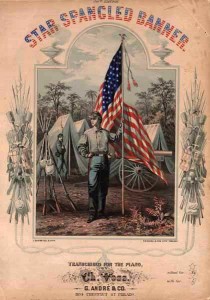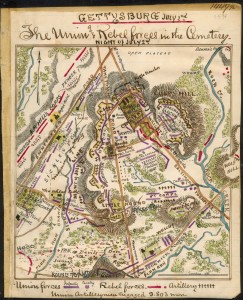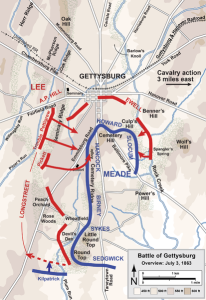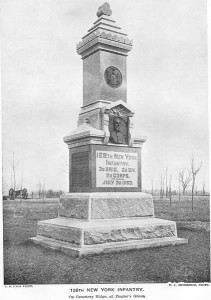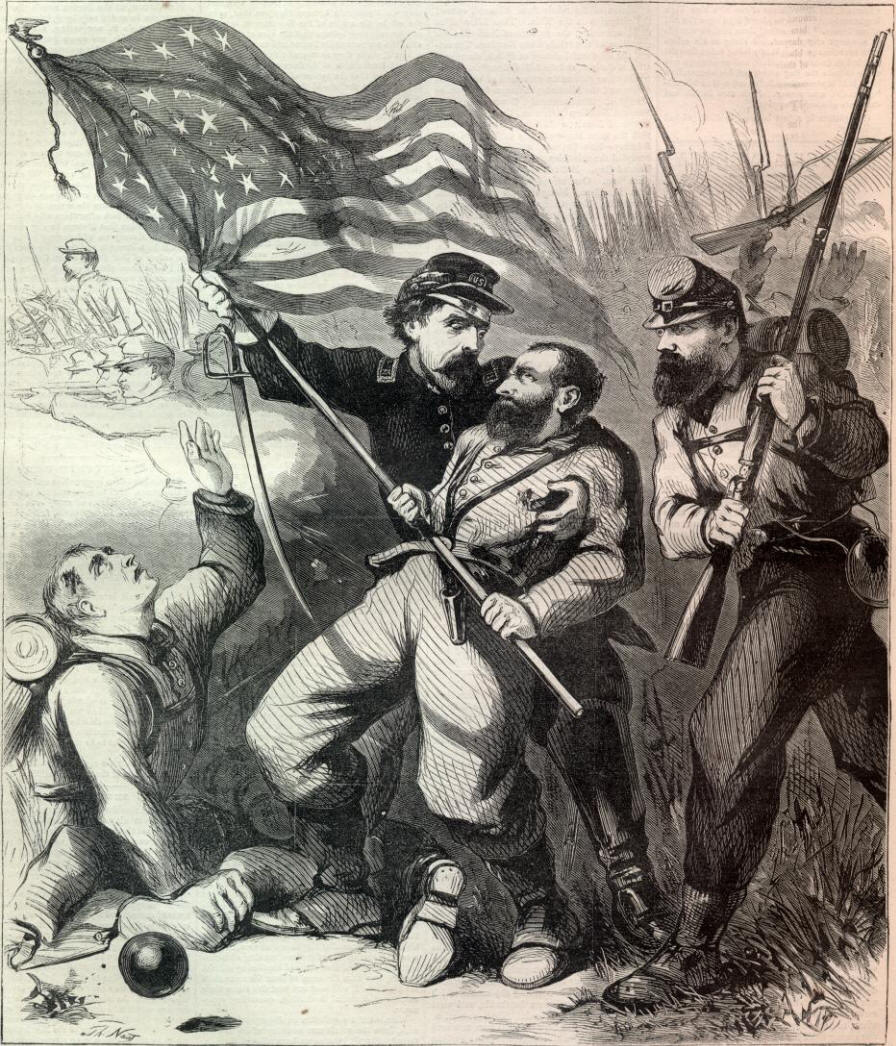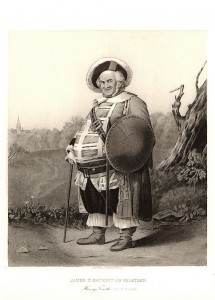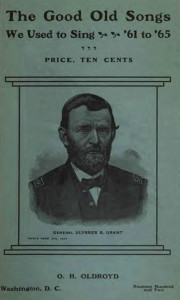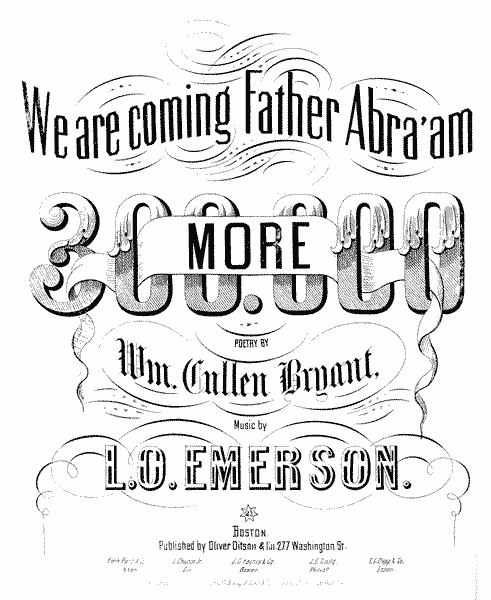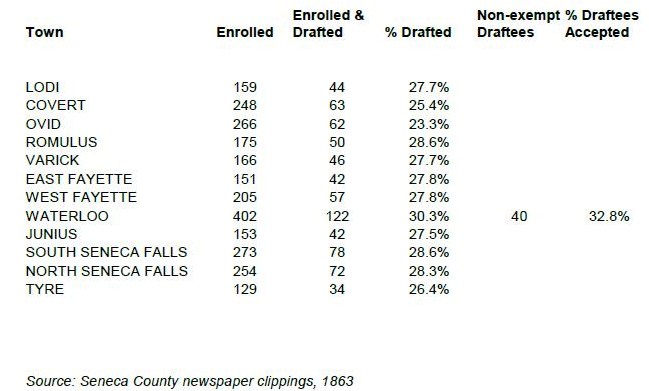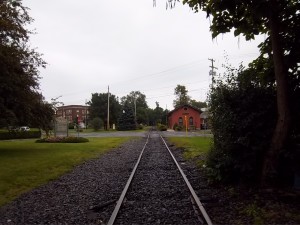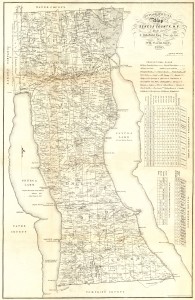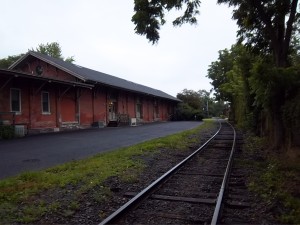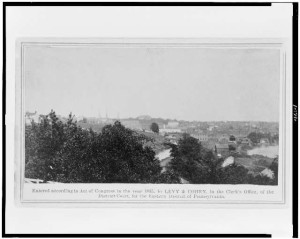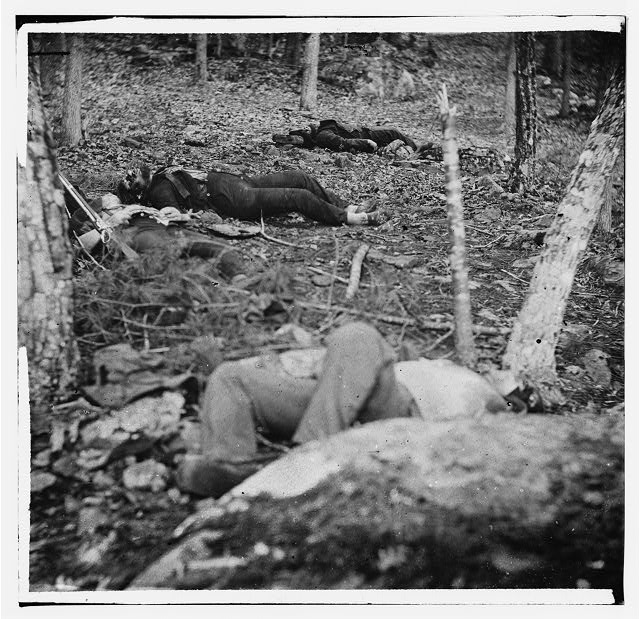Six weeks after Gettysburg, the assistant surgeon for the 126th New York Volunteer Infantry wrote home to explain that newspaper accounts had missed the extraordinary courage of the 126th’s color bearers during the battle.
From a Seneca County newspaper in 1863:
Letter from the 126th.
HEADQUARTERS 126th N.Y.V.,
NEAR WARRENTON JUNCTION, VA.,
August 15, 1863.
DEAR SIR:
In the various accounts of the battle of Gettysburg, published in the local press of our District, I see no allusion to our regimental colors, nor by whom they were borne upon the field. During the fight the colors had had five standard bearers, one of whom was killed, three wounded, and one escaped unharmed. At Harper’s Ferry, through the imbecility and treachery of those placed in higher command over us, we lost our colors, the beautiful banner borne by the regiment upon its departure from home; but at Gettysburg, wiser heads and truer hearts controlled us, and our colors came out of the fight unsullied, pierced seven times by the enemies’ balls, and torn twice by his shells. Our flag was carried into the thickest of the fight; five times its bearers were struck down, yet never for [a] moment did its folds trail in the dust. Fo[r] three long days did its faithful bearers cli[ng?] to its standard upon the bloody fields o[f] Gettysburg, yielding it successively only a[s] one was killed, three severely wounded and the remaining one bringing it off when victory had crowned our arms.
Sergeant ERASMUS E. BASSETT, of Co. B was the chosen standard bearer of the regiment. He carried the colors on the march and first planted the Stars and Stripes on the heights around Gettysburg on the morning of Thursday, July 2d. In the afternoon of the same day, when our left was pressed by the enemy in overwhelming numbers and the 2d Corps ordered to its suppor[t,] Sergeant BASSETT, bearing the colors of his regiment, advanced with it in the dreadful charge made by the 3d Brigade. When the Rebel lines began to waver; when the battle was nearly won, and victory seemed ours, he was struck by a ball in the leg yet he heeded not the injury. Rallying h[is] guard, and cheering those around him, he pressed on, but in an instant he was struck again, this time fatally, for he fell pierced to the heart, and died without a groan. In an instant his faithful guard avenged his fall, and the author of his death lay dead at their feet. Young BASSETT was good as he was brave. To know him was to admire. Of an amiable temper, always constant and attentive to his duties, he had won the esteem of all, and died universally beloved. the entire regiment mourns his loss.
Upon the fall of Sergeant BASSETT, Corporal AMBROSE BEDELL, of Co. E., took the standard, and bore the colors during the remainder of the fight that day.
On Friday, when the enemy sought to break our centre, Corporal BEDELL bore the colors into the fight. In a short time he was wounded, and Corporal HENRY MATTOON, of Co. D., seized the standard and gallantly bore the colors along. MATTOON soon fell wounded, and Private THEODORE P. VICKERY, of Co. H., next took the colors in a charge. In an instant VICKERY fell severely wounded, and for the fourth time, the colors were without a Standard Bearer.
At this juncture, Private LEWIS CLARK, of Co.K., a mere youth, seized the standard, and flaunting the Stars and Stripes defiantly in the enemy’s face, fore [bore?] them to the front, planting them near the Emmettsburg road, where the fight raged the fiercest, ylong [along?] which our regiment charged. Young CLARK subsequently carried the colors from the field, and delivered them to the custody of the “color guard.” I deem these brief facts in reference to the colors of our regiment worthy of notice, and trust that they will prove interesting. In thus referring to the brave color-bearers, I in nowise detract from others. The whole army in that terrible battle performed its duty nobly, and the 126th shares in its honors.
Sergeant BASSETT has gone to his reward, BEDELL, MATOON and VICKERY linger in the hospitals with their wounds, yet we trust will ere long recover and receive the reward due their bravery. Young CLARK, unharmed, though none the less brave, has been promoted, and we doubt not further advancement awaits him. Come what may, a grateful country will ever remember them, and the army with which they acted. All honor to the Flag, its brave defenders, and those who so gallantly carried it through the bloody around Gettysburg.
Very truly yours, for the Union, the Flag, and the cause in which we are engaged.
CHAS. S. HOYT,
Asst. Surgeon 126th N.Y.V.
Erasmus Bassett kept a diary, now held in Cornell University’s archives. Erasmus’ brother Richard, an officer in the 126th, found Erasmus dead on the battlefield and added this entry to the found diary: “12 O’Clock at night I find my Brother Erasmus lying dead where I took this from his pocket”. George Bassett, another brother, had been killed at Antietam.
According to the 126th’s roster Ambrose Bedell and Lewis Clark were both wounded at Spotsylvania. Theodore Vickery was killed June 22, 1864 “before Petersburg”. Charles S. Hoyt was promoted to surgeon of the 39th Infantry on May 20, 1864. Dr. Hoyt apparently was a prolific writer. Cornell owns a collection of the Hoyt Family Papers, including Charles’ diaries and scrapbooks. According to Caroline Cowles Richards, Dr. Hoyt wrote home when the 126th mustered in: “God bless the dear ones we leave behind; and while you try to perform the duties you owe to each other, we will try to perform ours.”
During Gettysburg the 126th was part of the 3rd Brigade, Third Division in Winfield Scott Hancock’s II Corps. The 126th’s Gettysburg monument summarizes its role during the battle. Eliakim Sherrill, the regiment’s colonel, was mortally wounded on July 3rd while he commanded the brigade and died the next day.
The following Thomas Nast illustration published in the September 20, 1862 issue of Harper’s Weekly at Son of the South pictured the gallant color-bearer of the 10th New York, but his “touching devotion to the flag” captures Dr. Hoyt’s theme.
Hal Jespersen’s map of July 3d at Gettysburg is licensed by Creative Commons.

